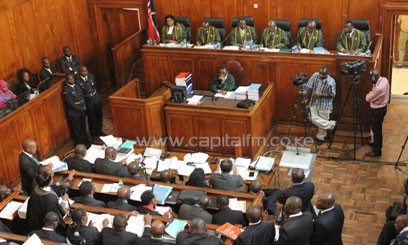On
July 4, 2011 Japanese Minister for Disaster Construction Ryu Matsumoto resigned
for making the following statements:
“We
will try to help those places that come up with ideas to help themselves, but
not those that don’t.”
He
made these statements in a region that lost 22,500 lives following earthquake,
tsunami and subsequent accident at the Fukushima Daiichi nuclear plant. Mr.
Matsumoto, who assumed the post a week earlier, angered local governors by
confessing his ignorance of local geography, and then showing irritation when
one local governor made him wait in a reception room. That occurrence is
unthinkable in Kenya where helpless wainianchi are mocked for ‘tunaomba
serikali’ -pleading with the government for intervention whenever disaster
strikes.
But
Kenya is not prone to natural disasters. Most grey sports in the history of our
country have been (and still are) actions of fellow countrymen/women in
positions of authority to whom public trust is bestowed. We have given them a
definite judicial term: historical injustices. For that term alone, the grand
coalition government set up Truth Justice and Reconciliation Commission (TJRC) five years
ago.

TJRC Chair Amb. Bethwel Kiplagat handing over the report to President Kenyatta
The
Commission finalized it work and handed over the report to President Kenyatta
yesterday. TJRC is one of the three commissions of inquiry formed after the
2007/8 post poll chaos that claimed over 1,133 Kenyan lives and fashioned in
the likeness of South African TJRC at the end of white minority rule in 1994.
Its formation was informed by the findings and recommendations of Justice Kriegler’s
Independent Review Commission (IREC) which held that historical injustices
largely contributed to the post-election violence and ought to be addressed to
ensure lasting peace and stability.
Still
on the IREC recommendations, Commission of Inquiry into the Post-Elections
Violence (CIPEV) was constituted to establish the causes of PEV and bring to
book those who bore the greatest responsibility. The findings of CIPEV were
documented in Waki Report and a sealed envelope containing the names of persons
whose actions contributed to the chaos was handed over to the chair of Africa
Eminent Persons, Dr.Kofi Annan, who later vouchsafed the envelope to former ICC
prosecutor Luis Moreno Ocampo.
From
the onset, TJRC suffered a lot of internal setback pitting the chair, Amb.
Bethwel kiplagat, and his vice, Ms Betty Murungi, over the former’s fitness to
lead the commission with allegations of roles he played in both Wagalla Massacre
and the death of former Foreign Affairs Minister Dr. Robert Ouko. Amb. Kiplagat
stepped aside as the chair (and not commissioner) before both the high court
and a special tribunal cleared him.
A
part from the norm that most reports gather dust in government cabinets without
decisive actions, the dilemma of TJRC Report lies in the fact that it mentions
those who have the authority to implement it as well as one of its drafters.
Kenyans now doubt the impartiality of the report given that the TJRC chair is
mentioned in both Dr. Ouko Murder and Wagalla Massacre whereas President Kibaki
who formed the commission was in power when the chaos erupted and was most likely inclined towards a partisan commission, according to public opinion. The
report therefore does not enjoy public support.
On
the same note, President Uhuru Kenyatta who received the report and his deputy are
adversely mentioned citing roles they played during PEV, which has since seen
the duo facing crimes against humanity charges at the ICC. But the woes of Mr
Kenyatta are more because the report also implicates his father, the founding
father of the nation, for having fraudulently acquired larger percentage of
former white highlands immediately after independence. As such, Kenyans would be wondering whether Mr
Kenyatta has the moral capacity to implement the TJRC report fully.
President Uhuru kenyatta (right) at the ICC
The
greatest challenge to the implementation of TJRC report is that those who
allegedly perpetrated historical injustices and their kin are still holding
powerful positions in government and may thwart every effort to redress the
wrongs, even with effective separation of powers in all the three arms of government.
According to the report, a total of thirty two former and current politicians
are culpable –some of whom are members of the National Assembly. To corroborate this
argument, over five politicians including Kitui Senator Hon David Musila are in
the process of suing TJRC for naming them in the report.
If Kenya
was Japan, all those implicated would voluntarily cease to hold public offices
and offer profuse apologies to the people of Kenya. However, the law holds the accused persons
innocent until proven guilty!
Shem Sam


